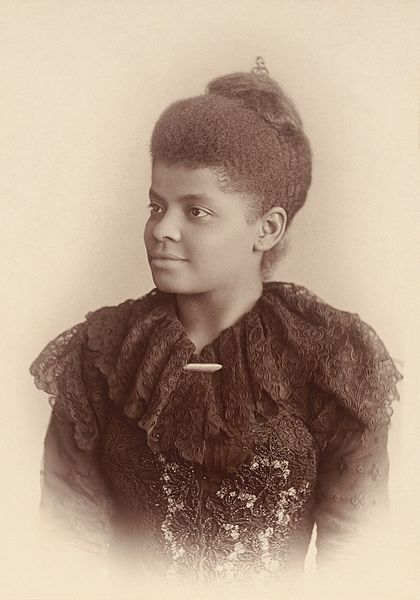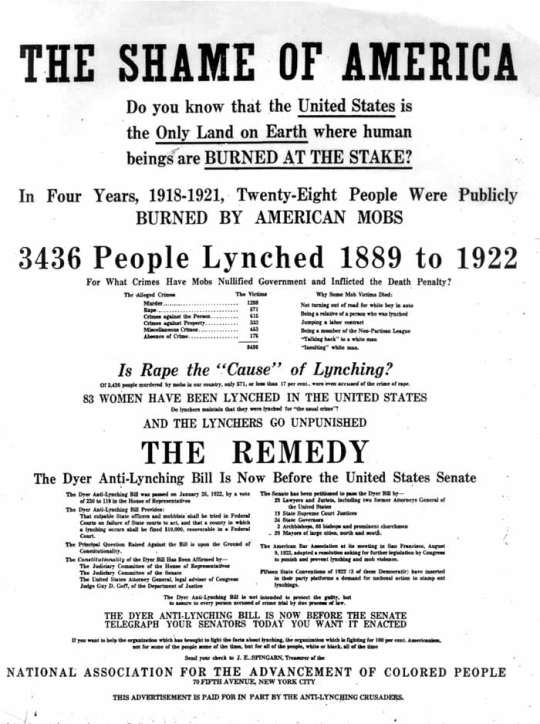Don't wanna be here? Send us removal request.
Text
A Voice for the Voiceless: The Legacy of Ida B. Wells

Photo: Ida B. Wells Barnett, in a photograph by Mary Garrity from c. 1893.
Ida Bell Wells was born into slavery in 1862 and emancipated by the Union Army six months later. She leaves behind a legacy as a voice for the voiceless, as one of our nation’s foremost critics of a racial injustice and a journalistic champion of the truth.
Her family was very active during the Reconstruction period and members of the Republican Party. Her father, James Wells helped to found Shaw University in North Carolina. After a tragic illness, Wells lost her parents and moved to Memphis, TN. She began her career in activism early as a student at Fisk University.
In 1884, after refusing to give up her seat on a train to a white patron, she was forcibly removed and later sued the railroad. She initially won a $500 settlement, but the ruling was overturned by the Tennessee Supreme Court.
This was her “aha” moment where she began her one woman crusade for injustice. Wells turned to writing and began chronicling issues of race and politics in the Deep South. Under the name “lola,” Wells became a leading voice on issues of racial injustice and eventually owned three newspapers including; Memphis Free Speech, Headlight and the Free Speech.
In addition to her civil rights work, Wells also worked as a teacher in a segregated school. Her work there led her to attack the system of segregation and her vocal displeasure eventually got her fired.
However, it was the deaths of Tom Moss, Calvin McDowell and Will Stewart—three African American business owners in Memphis—that ignited her charge to take on lynching. Moss, McDowell and Stewart were killed after they opened a grocery store that directly competed with a white-owned store and drove business away.
“Our country’s national crime is lynching. It is not the creature of an hour, the sudden outburst of uncontrolled fury, or the unspeakable brutality of an insane mob.” —Ida B. Wells

Photo: Ida B. Wells (author), Southern Horrors: Lynch Law in All Its Phases, book cover, 1892.
In response, Wells traveled the South gathering records of lynchings and wrote “Southern Horrors: Lynch Laws in All its Phases” in 1892. Her reports outraged southern whites and she was never able to return to Memphis. The next year she published “A Red Record,” a personal reflection on the lynching crisis and spoke around the world about the atrocities going on in the United States.
Segregation remained a cause close to her heart and Wells authored a response to the 1893 World’s Columbian Exposition decision to ban black exhibitors.
She wrote:
“The exhibit of the progress made by a race in 25 years of freedom as against 250 years of slavery, would have been the greatest tribute to the greatness and progressiveness of American institutions which could have been shown the world. The colored people of this great Republic number eight millions – more than one-tenth the whole population of the United States.” Ida B. Wells, “The Reason Why the Colored American Is Represented in the World’s Columbian Exposition.”
In 1898 she took her anti-lynching campaign all the way to the White House, urging President William McKinley to act to save black lives. Although several bills would be introduced, the United States has never explicitly outlawed lynching.

Photo: This is a flyer created by the NAACP in 1922 to raise awareness about the lynching epidemic that was occurring and the proposed Dyer anti-lynching bill.
420 notes
·
View notes
Quote
The stupid neither forgive nor forget; the naive forgive and forget; the wise forgive but do not forget.
Thomas Szasz (via fyp-psychology)
5K notes
·
View notes
Photo

Even if it's rainy 🙂#haveagoodday #mondaymotivation
1 note
·
View note
Quote
One day I decided that I was beautiful, and so I carried out my life as if I was a beautiful girl. I wear colors that I really like, I wear makeup that makes me feel pretty, and it really helps. It doesn’t have anything to do with how the world perceives you. What matters is what you see. Your body is your temple, it’s your home, and you must decorate it.
Gabourey Sidibe (via wordsnquotes)
70K notes
·
View notes
Photo

Bookshops are time machines spaceships story-makers secret-keepers dragon-tamers dream-catchers fact-finders & safe places (this book is for those who know this to be true) #jencampbell #thebookshopbook
0 notes
Photo








ART PRINTS BY LUDWIG VAN BACON
Red Riding Hood Big Bad Wolf
Boys Dont Cry
Balloon Killer
The Bat & The Bird
ROTTEN APPLE
Two Broken Hearts
Little Red Riding Hood
Fall Heart Tree
Also available as canvas prints, T-shirts, tapestries, stationery cards, laptop skins, wall clocks, mugs, rugs, duvet covers, All over print shirts, Phone cases, Throw pillows, tote bags and More!
2K notes
·
View notes
Photo

Image via We Heart It http://weheartit.com/entry/173444031 #motivation #passion #quotes #saying #success #love
0 notes
Photo

#chocolate #love #tiger #comfortfood #tiger (à Canary Wharf, East London)
0 notes








